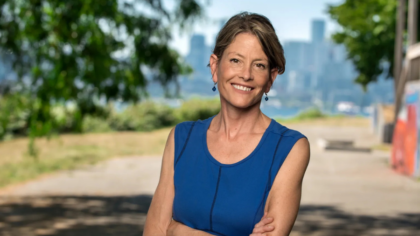‘College freshman posing as political radicals’: WA rep. has no faith in next Seattle mayor
Aug 10, 2025, 5:00 AM
Two candidates remain in the race for Seattle mayor: incumbent Bruce Harrell and progressive challenger Katie Wilson.
However, Washington State Representative and Republican Party Chairman Jim Walsh is not convinced by either of them.
“We’ve got a goofball mayor, and maybe he’s not goofy enough. We’ve got a challenger to the goofball mayor — I don’t know what she calls herself, communist, socialist. None of them have a deep philosophical basis in anything. They’re basically a bunch of college freshmen posing as political radicals,” Walsh said on “The John Curley Show” on ����Xվ Newsradio.
Wilson, the co-founder and executive director of the Transit Riders Union, received the most votes for mayor in the primary election with 44,457 votes (46.2%), leading Harrell by 1,297 votes (43,160 votes, 44.9%).
Walsh said that while Wilson seems like a nice person, he believes she won’t have a grasp on local business.
“She’ll get her turn, and she’ll run whatever business is left in Seattle proper out of Seattle,” he said. “The rest of the state thanks you. We’ll pick up some of that business.”
Republicans are working to fix the state as a whole, according to Walsh. But he believes Seattle will get worse before it gets better.
“It’s got to get dark before it gets light. I think the City of Seattle has just been getting darker and darker, and it’s unfortunate,” he said. “I mean, I like the look of the place. I like what Seattle used to be, but it’s a mess now, and it’s going to get messier. And, in the meantime, we’re going to try to fix the state as a whole.”
Walsh says rural hospitals in WA aren’t going anywhere
As the topic changed to rural hospitals, Walsh showed his disdain for Governor Bob Ferguson’s warning that funding is being cut.
“That’s fake, and the governor knows it’s fake,” he remarked. “Shame on him for running this stupid stuff that he’s saying. It’s desperate and fake.”
Ferguson cited a reconciliation bill that had the potential to close 300 rural hospitals, including 14 in Washington, according to Walsh.
“Nobody actually called those hospitals. I did. I called a couple of them, and they said that the study that this was based on, which was done out of some group back east, in North Carolina or something, was methodologically faulty, and that it overstated the impact,” Walsh said. “These hospitals aren’t closing anywhere.”
He said the problem isn’t the reconciliation bill, it’s the “steady erosion and dilution of Medicaid reimbursements, the payments to doctors and hospitals.”
Listen to the full conversation below.
Listen to John Curley weekday afternoons from 3 – 7 p.m. on ����Xվ Newsradio, 97.3 FM. Subscribe to the podcast here.

















